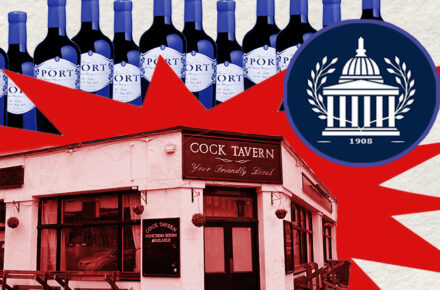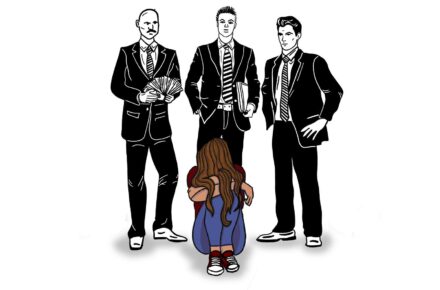This article was awarded Best News Story at the 2023 Student Publication Association Awards and Best Media Piece at the 2023 Students’ Union UCL Arts Awards.
Neil Majithia and Elettra Plati
Four years ago, the UCL Students’ Union acted on its ban of initiations and disaffiliated Men’s Rugby after the society was found guilty of breaching regulations surrounding peer pressure – having forced freshers to drink heavily and sign NDAs so their initiation ceremonies were never made known. The Union cut all ties with the team, removing them from all competitions and banning their use of UCL facilities. This aimed to set a precedent of the Union’s zero-tolerance approach towards initiations, which are banned in the Clubs and Societies Regulations.
However, as that precedent faded out of memory, socials resembling initiations made a comeback. The Cheese Grater has received multiple tips about high profile societies pressuring newcomers to drink heavily and participate in ceremonies – including stuffing Weetabix and ketchup into their mouths, or licking the tube floor, or worse.
These socials are not called initiations by the societies. Instead, they are referred to by euphemisms like “New Recruit Night” or a “Freshers’ Social”. Many of the drinking games are only played at the first social, and only played by people new to the society, and with forfeits much worse than standard drinking games entail. The only difference between these events and initiations is the name.
Despite this, the Students’ Union should be able to see through the facade. The euphemisms and code names are easy to spot and it’s hard to believe that the Union is blind to them. The Union must not wait for complaints before acting – it should actively prevent initiations, to keep freshers safe on one of their first socials at university.
In an interview, an ex-member of Women’s Lacrosse shared her own initiation experience from last year, which she described as “pretty hellish”. Despite not being called an initiation, she notes that “it was very obvious from the activities that we were doing and who was leading them, that it was an initiation”. Amongst the activities she had to partake, this student recalls that the initiation opened with a chugging relay, and then continued with a series of drinking games, always led by seniors or committee members.
“After [the chugging relay] we had a bigger relay, and the lacrosse tradition is getting ginned. So senior members gin you if you break the rules, and they have rules in place”. How much the initiates were drinking was therefore up to senior or committee members. If you break the rules, the student explains, “they make you put your head back and pour the gin, and they decide how much they pour”. Meanwhile, the leaders of the society “didn’t have to participate in anything”, enjoying a power trip on a night out at the expense of freshers.
After the relays, the senior members “put dry Weetabix in [the freshers’] mouths”, and then condiments like barbeque sauce, ketchup and mayo. Freshers were forced to eat this, and then they got ginned again. The amount of gin required for this social alone likely contributed to the £3.5k loss the Lacrosse club made last year.
Freshers were then duct taped together and forced to compete in more challenges, and get ginned even further. At this point, members of the public came up to the group and “asked if everything was okay, and whether everyone was consenting to this.” Evidently the initiation seemed more like a hostage situation than a university social.
Throughout this exhausting night, the interviewee said senior members of the society “weren’t trying to talk” to the freshers at all, despite the idea of the first social being an introduction of new recruits to their teammates. This represents the true nature of these initiations: the senior members of the society taking advantage of the freshers for their own benefit.
The power dynamic of initiations results in extreme peer pressure for the participants, who feel like they have no other choice but to do what they are told for the mere purpose of fitting in. At Lacrosse, members felt pressured into not leaving the event and completing all of the challenges, One interviewee said “there weren’t opportunities to leave”, possibly owing to the freshers literally being taped together. This initiation took place late at night in a park near Loop, making it unsafe for a drunk fresher to get home by themselves after refusing to get ginned one more time.
A RUMS Hockey member had an equally exhausting time on their first social, which is totally not an initiation. They revealed that “new recruits were told to drink and run a lap around the forest.” Further, they said that even when people did resist drinking games they would often relent “just to shut [senior members] up”. Worse still, even though they conceded that senior members ultimately could not force you to drink, they emphasised that “older years won’t form a connection with you as much, in a way they’ll like you less than if you did the games.” It is horrific that students feel that to truly be part of the community they must participate in these immature, dangerous drinking games.
Even after making it through the outdoor games, it did not get better. The RUMS hockey member stated that the environment in Mully’s was nothing short of grim: “[It] turns into an absolute den. Chun buckets everywhere.” While one could admire the planning that sports societies make to ensure the floor of Mully’s remains chunder-free, we should question whether the Students’ Union should be associating themselves with events where it is necessary to prepare for so many new students getting dangerously drunk.
Regardless of the venue, it is hard to expect a fresher to say no to challenges when they’re in an environment heavy with peer pressure. Further, while many committee members will say that these initiations help foster a sense of a community and bonding, we’ve heard otherwise. When discussing the relationship between RUMS Rowing committee and regular members an interviewee described, “the vibe is quite authoritative.” This manifests in multiple ways. “If you’re being told to drink, it’s quite hard to refuse, I’ve never seen it before. No one has the balls to do that”. While RUMS Rowing seniors do participate in drinking games, they have the advantage of actually knowing the rules. For unassuming freshers, it is not the same: “Freshers don’t know the rules [of these games], so they get made to drink more often.”
Drinking initiations in RUMS are especially secretive. This is because the General Medical Council will examine any irresponsibility a potential doctor has been involved in in their past, and not approve their qualification if deemed too disreputable. This creates a fear of speaking out in fear of jeopardising their future careers. Thus, RUMS Rowing act with a deliberate secrecy to ensure their malfeasances are not public. When questioned about an alleged drinking game called puffing, an interviewee responded, “Oh yeah, I can’t disclose this information […] they don’t want people to know about it, I’m not confident enough to expose their secrets.” After being asked how they knew this information was meant to be secret, they elucidated, “So when seniors in the club talk about these questionable things they use [code] names, and when you try to ask they’ll seem like they don’t want to give you details or they’ll tell you straight out people aren’t supposed to know about it.” In this instance there should be no doubt that the committee is complicit in these actions, creating an atmosphere where students do not feel comfortable expressing their uneasiness.
You would expect the role of the committee is to break up any atmosphere like that, and stop harmful situations from developing. The Lacrosse president assured us that they do this by looking out for those who might be having a bad time and reminding them they don’t have to do anything. However, in terms of actual intervention, the president said “it’s hard to limit what people challenge other people to do,” and “people are adults at university, and I’m not going to stop someone from choosing to drink.”
Not all committees find this task so difficult. The Women’s Cricket president encouragingly stated, “we are alert to [peer pressure to drink] and we can sort help and intervene.” Further, “[They’re] also organising active bystander training for the committee to be compulsory and encouraging other club members to come along with that as well.” The difference between some societies is staggering; while some rely on one sober committee member to safeguard freshers at initiation nights, others proactively ensure that the entire committee is trained to diffuse any arising complications.
This negligence is why the challenges and ceremonies get so bad, and why freshers are so mistreated. A lack of active intervention means no repercussions for senior non-committee members when they duct tape freshers together, or pour choice condiments down their throats.
It is not only the first socials of term that societies hold these initiations, but also the tours that many sports societies take. One RUMS Rowing member told us that “all the freshers are only allowed to bring a bumbag with all their belongings in it,” stating further “there are a couple things on tour I think that could be cast as an initiation.” Being robbed of any reasonable storage space where you only have space for your phone and a charger is too far. It forces you to rely upon the kindness of your seniors- the same seniors who speak in codenames so that they can keep themselves safe, for belongings like clothes, amenities, and all essentials when travelling.
The freshers-committee dynamic involves the superiority complexes of committee members and the vulnerability of freshers.
First year students join sports societies in part for the sport, but in part to find friends in an environment that is entirely new to them. An ex-member of Men’s Hockey noted that during his initiation, freshers would go as far as licking the floor of the tube if they spilled their drink, having been pressured to do so by senior society members. If they didn’t, they were “disrespecting the committee” and forced to do 10 press-ups and take a shot of gin. They were also made to get into the bag holders on the tube ceiling, or forced to drink again. This all took place in a 1:30 p.m. to 2 a.m. alcoholic binge that new members were pressured into taking part in. Later in the evening, the society played drinking games but conveniently didn’t explain the rules to freshers. If they then broke the rules that they had no knowledge of, they were “punished” by being made to chug 5 pints of beer.
A RUMS Cricket interviewee said they “would do anything so that older years like them more.” For committee and senior members, this becomes something to exploit and have a laugh about. “It was demeaning through ageism, but of course it was. In the first two weeks the older members make an example of you being a fresher. It was definitely a sort of hazing.” Freshers are made to believe that giving into the pressures of initiations is the only way for them to make friends, get into a team and appear “likeable” to the rest of the club. Therefore, they have a hesitant willingness to take part in the ceremonies in fear of being a “fun sponge” and its consequences. This dynamic contributes to an unwelcoming environment for new students that stains the reputation of UCL.
Intervention is necessary because the Students’ Union has a duty to take responsibility for the safety and wellbeing of first year students. The 18-19 year olds fresh out of secondary school won’t have a high alcohol tolerance, and can end up seriously ill from drinking as much as they’re made to at initiations. Furthermore, being new in an unfamiliar place makes them extremely susceptible to peer pressure, and without intervention, that is taken advantage of.
Initiations also create a barrier of entry for people who choose not to drink. At Lacrosse, the ex-member said, “there wasn’t an option to not drink … you just wouldn’t come to socials if you didn’t.” RUMS Rowing is similar, “if you’re not a drinker or you’re not ok with drinking culture, there’s not really much to do at a RUMS Rowing social.” They expanded, “There are some people who attend, who don’t drink, who just drink like pints of water, but I feel like you need to have a confident relationship with alcohol to be in that environment.” Initiations add to the alcohol-centric culture at sports societies, which excludes anyone who doesn’t drink.
In reality, the concept of an initiation boils down to new people being introduced to the society, and this can be achieved without the exploitation of freshers that characterises initiation culture as we know it. Positive stories of initiations have also been shared with us, and are a viable alternative to the undesirable ceremonies that currently take place.
For example, In Women’s Cricket, the first social was a team-building curry night, where they had dinner together before heading to the pub. Because this society made a concerted effort to distance themselves from a heavy drinking culture, the focus of the social was getting to know the new members over a meal rather than pressuring them to drink.
Their socials throughout the year reflect the welcoming atmosphere Women’s Cricket creates at that first curry night, and this shows even in drinking socials. The president said they always have two sober people at socials, and at the sight of somebody being pressured they can “sort help and intervene”. She has also organised active bystander training for the entire committee.
This has borne fruit – the society is a close knit family, and they didn’t need initiations and heavy drinking to build that community. “People say there isn’t that barrier you’d expect with women’s cricket where you’d have to drink loads, or do a weird initiation ritual. It’s really beneficial to move away from,” says the president.
Squash society has a similar account. By diversifying away from sports night and having unrelated socials and different experiences, the society has made it clear that you can be a part of the society without having to take part in drinking or initiation culture. The president explained, “With team based sports, freshers will probably feel more pressure to do stuff to be a part of the team, but here you don’t have to do that at all.” Despite this, both the Women’s Cricket and Squash presidents thought it was easy to stop initiations and rebuild cultures at all sports societies, and doing so would be the best for all parties.
Seniors taking advantage of freshers at initiations is still a recurring issue. Students either do not know about or are too afraid to use reporting channels, meaning the SU is often unaware of these incidents. Consequently, minimal intervention gives offenders freedom to carry out these unchecked initiations. Action needs to be taken to ensure that all students, regardless of whether they drink, are safe and have fun during sports societies’ socials. Afterall, sports should be welcoming to all, not just those who want to lick the tube floor.
The Cheese Grater contacted the Students’ Union for comment on allegations about initiation ceremonies and the evident lack of intervention and regulation.
A spokesperson said: This type of behaviour has no place in our club and society culture and the reports described in this article are very concerning.
We have not received any complaints or anonymous reports from committees, club or society members, or other students regarding this type of behaviour so far this academic year. However, each report in this article will be immediately investigated and those found to have breached our regulations will face disciplinary action.
If you have experienced, or witnessed, this type of behaviour, please come forward. We encourage students to make anonymous reports of this type of behaviour, either directly to the Union or via UCL’s Report + Support tool. Sports club members can make reports directly to BUCS.
Extensive training is given to club and society committees ahead of each new academic year. This training sets out the expectations of committees to build an inclusive culture in their groups and the rules and regulations related to unacceptable behaviour, including any behaviour that could be considered an initiation.
Additional reporting by Marius Bommier and Zhenya Robinson









